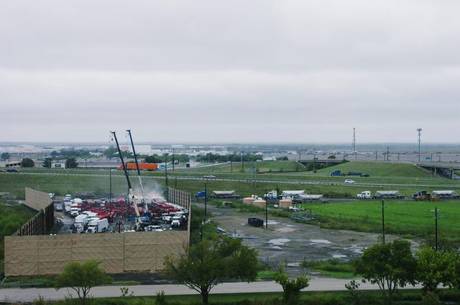The top court in the state of New York affirmed the rights of cities to ban hydraulic fracturing, in a much-watched case nationwide.
In a 5-2 decision, the state Court of Appeals said the cities of Dryden and Middlefield used their “home rule” authority appropriately by banning fracking before it ever came to them. Whether the decision has implications for Texas cities, including Denton, that already have thousands of acres in production, remains to be seen.
A trustee for Norse Energy challenged the Dryden ban, acting on behalf of the Norwegian company that went bankrupt after amassing thousands of leases on New York land it was never able to develop. A dairy farm that had leased land for drilling, Cooperstown Holstein, challenged Middlefield’s ban. But the justices rejected their claims that state oil and gas law trumps local authority for land use regulation.
“The towns both studied the issue and acted within their home rule powers in determining that gas drilling would permanently alter and adversely affect the deliberately-cultivated, small-town character of their communities,” according to the majority ruling by Judge Victoria Graffeo.
In his dissent, Judge Eugene Pigott Jr. argued that the local ordinances, which touch on areas such as storage and production materials, are so broadly written they create “a blanket ban” on the industry.
“The zoning ordinances of Dryden and Middlefield do more than just regulate land use, they regulate oil, gas and solution mining industries under the zoning,” he wrote.
Karen Moreau of the New York Petroleum Council said the ruling threatens the rights of landowners who want to lease their property for development and reduces the chances of long-term investment in the region.
“There are real losses here, and it’s a real tragedy for thousands of impoverished farmers and rural people,” she told The Associated Press.
More than 170 cities in New York have banned fracking. Another 40 have passed resolutions supporting the practice, but the state has been under a moratorium for six years as officials study the health impact.
The Texas Independent Producers and Royalty Owners Association didn’t offer a statement on the decision Monday. Deb Mamula, executive vice president of the Texas Oil and Gas Association, said the group didn’t have a comment either.
“These cases are state-specific and are based on each state’s laws,” Mamula said in a prepared statement.
Jim Bradbury, an environmental attorney based in Fort Worth, said the opinion reflects a trend in the law as it catches up with the wave of oil and gas drilling and fracking in urban areas.
The debate between state and local powers in Colorado underscores the trend, he said.
Colorado Gov. John Hickenlooper sued several cities that banned fracking, but a new statewide initiative to affirm municipal home rule authority has pushed state officials to the bargaining table with cities.
“Otherwise there wouldn’t be any need to compromise at all,” Bradbury said, adding that the Dryden decision underscored one of the primary powers of local government: land use planning.
“No other creature in government does that — there is no state department of zoning,” Bradbury said.
However, because Texas cities didn’t use that power when the Barnett Shale drilling boom first arrived, it could be difficult for them to “stick their heads out of the foxhole” and exercise that power now, Bradbury said.
Denton City Attorney Anita Burgess agreed that the implications of urban drilling are being considered across the country and around the world.
“It will likely take time for cases to work through the judicial system before there is a great deal of predictability as to the possible outcome of some of these questions,” Burgess wrote in an email.
But Denton residents aren’t waiting. They tapped other, well-established local government powers when they petitioned for a citywide ban on fracking: those police powers that protect the health and safety of residents. Nearly 2,000 residents signed the petition that organizers submitted in early May.
Resident Cathy McMullen, who helped organize and circulate the petition, said that the Dryden decision affirmed for her what some residents had long been saying: The city didn’t have to allow drilling and fracking so close to the places where people live, work and play. Now, Denton has 270 wells inside its corporate limits and more in its extraterritorial jurisdiction.
“We have so many people that are directly impacted and we’re just not getting a benefit for us,” McMullen said.
The Denton City Council is expected to take up the petition for a local ban on fracking at its regular meeting on July 15.
The Associated Press contributed to this report.
PEGGY HEINKEL-WOLFE can be reached at 940-566-6881 and via Twitter at @phwolfeDRC.




